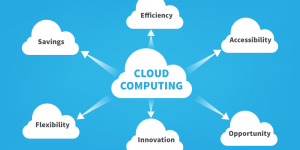
The concept of Quantum Computing as a Service (QCaaS) can be regarded as a cloud computing model in which users have access to Quantum Computing. This service delivery model operates similarly to other “as-a-service” paradigms used in the IT industry including IaaS and SaaS. This computing model has applications across diverse industries and services. The evolving technology offers access to specialized hardware, software, and expertise without expensive acquisitions, set-ups, or maintenance costs.
Quantum cloud computing is versatile because it provides access to a wide array of technologies and algorithms which allows one to try. To understand the scope of the QCaaS it is necessary to establish what Quantum computing is and how it is conducted.
What is Quantum Computing?
Quantum computing is an innovative technology that was developed based on the laws of physics of the quantum mechanics of computing that involves the capability of solving problems that cannot be solved in a classical computer. Quantum computers are based on quantum bits, or qubits as opposed to conventional bits of “0 or 1 of the classical computers. Quantum computing has a wider application potential ranging from drug discovery to material sciences and logistics to finance.
The revolutionary computing model is also ideal for improving machine learning techniques for applications such as natural language processing and picture recognition. Quantum computing is anticipated to revolutionize varied sectors and solve problems that seem unsolvable by conventional computing models.
How Does Quantum Computing as a Service (QCaaS) Works?
QCaaS systems facilitate the acquisition of quantum hardware and software by adopting a cloud-based model. Here’s how QCaaS operates in more detail:
1. Cloud-based Platform: Quantum computing hardware, software, and tools are available through cloud offerings of the QCaaS providers.
2. Remote Access: This way, instead of investing in expensive quantum equipment, users get access to these resources through the Internet.
3. On-Demand Services: QCaaS business models include Pay-as-you-go or subscription-based quantum computing services where the customers can scale up their resources for their needs.
Application Areas for Quantum Computing as a Service (QCaaS)
QCaaS is still a developing technology but has the potential to transform varied businesses and sectors. The emerging technology has wider applications in fields ranging from data analytics and optimization to cybersecurity. Potential areas where Quantum Computing as a Service (QCaaS) can play a crucial role include the following:
- Data Optimization and Analysis: QCaaS is capable of optimizing large-size data sets and at the same time can perform complex calculations. This technology can prove handing in effective data optimization.
- Cybersecurity: Quantum computing as a service, or QCaaS, has the potential to completely transform cybersecurity because of its unmatched processing capacity to tackle difficult security issues. Large volumes of data can be analyzed by QCaaS to find anomalies and possible risks that conventional security systems would overlook.
- Logistics and Supply Chain Management: QCaaS can prove productive in e-commerce and logistics businesses. It can transform vehicle route optimization, inventory management, supply chain optimization, warehouse and transportation network optimization.
- Healthcare Sector: Quantum computing can revolutionize the healthcare sector and other allied sectors by promoting the speed of drug discovery. The technology is capable of supporting the fast discovery of new and personalized medicines.
- Artificial Intelligence (AI) or Machine Learning (ML): Quantum computing is highly rated for enhancing the accuracy of AI and promotes the use of quantum machine learning algorithms.
- QCaaS in Cryptography: The field of cryptography is expected to be greatly impacted by Quantum Computing as a Service (QCaaS), both in terms of breaking current encryption systems and creating new, quantum-resistant algorithms.
Key Benefits of QCaaS

Cloud-based quantum computing has several advantages and has the potential to be a driving force for transformation in varied sectors. Some of the key benefits of Quantum Computing as a Service (QCaaS) include:
1. Accessibility: As a subscription model, QCaaS allows any company to leverage quantum computing, regardless of its previous experience and financial resources.
2. Cost-Effective: As pointed out, QCaaS enjoys the advantage of minimal costs as far as cloud-based quantum hardware possession and maintenance are concerned.
3. Scalability: It can be however observed that users can upgrade their quantum computing resources as and when required which gives them the flexibility that they need.
4. Innovation: QCaaS enables a provider to sell quantum computing as a service which also provides an environment that may enable researchers and developers to experiment.
5. Resource Management: Calibration together with cooling and the necessary maintenance works are performed by the service provider and not the user, thus reducing the operating load.
6. Expert Support: It is integrated with the platform as users can get the advice of quantum specialists which may be valuable for companies that start to implement quantum computing technologies.
Quantum Computing Services by QCaaS Platforms
QCassS platforms deliver a range of Quantum computing services such as the following:
1. Quantum hardware access: QCassS platforms allow users to use quantum computers especially systems based on superconducting qubits or trapped ions.
2. Quantum software tools: Programmable QCaaS vendors provide quantum programming languages and environments for users to compose and execute quantum algorithms.
3. Quantum algorithm development: QCaaS platforms can help users build quantum algorithms for certain applications.
4. Quantum simulation: Quantum systems can be simulated by users to learn more about how they behave.
Conclusion
In conclusion, an approach in the utilization of the cloud called Quantum Computing as a Service (QCaaS) allows individuals to have access to quantum computing resources. It allows consumers to leverage on quantum computing potential without making a huge investment or having any background understanding of quantum hardware.






